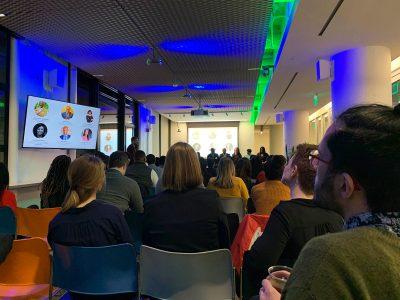In honor of Black History Month, National Society of Black Engineers Boston held a panel Wednesday on the state of diversity in fields like real estate and architecture and discussed steps one can take to make needed change and continually strive for equity.

The panel, held in collaboration with software corporation Autodesk at the Autodesk Technology Center in Boston, was titled “Diversity by Design: Achieving Equity for Minorities in the AEC [Architecture, Engineering and Construction] Industry.”
Speakers included Kenn Turner, the director of diversity and inclusion/compliance at Massachusetts Port Authority, and local entrepreneur Shelley Webster, who founded consulting firm InOrder Business Development Solutions.
Turner said at the event that it’s important to confront and engage in conversations about diversity, regardless of how it may make people feel.
“If there’s a woman in the room and she makes a comment, and there’s a man that makes the same comment essentially 10 minutes later and people say, ‘great comment Bob,’ say, ‘Oh I think it was a great comment, too, when Shirley made it 10 minutes ago.’” Turner said. “People aren’t willing to do that.”
Autodesk Senior Manager Queen Denchukwu moderated the event and said the panel’s main purpose was to critique and provide lines of actions for the lack of diversity in industry.
“We’re here tonight to talk about diversity in the industry sector,” Denchukwu said at the event.
Webster said during the event that it’s important to actively strive for equity by using metaphorical vacuum.
“You cannot do diversity in a vacuum,” Webster said. “The conversations have to be had now to bring about awareness as to why this is important, what the moral compass is, why should do it. And also, when you have diverse people going at the work it just creates a better environment, a better outcome.”
During the event, Denchukwu specifically mentioned the lack of diversity and equity in architecture.
“African American architects represent about two percent of all licensed architects out of 113,000,” Denchukwu said. “African American women represent approximately 0.3 percent.”
Turner also said that there needs to be a change, not just in the workplace, but also in the overall community, saying that the lack of equity is similarly apparent in the community when it comes to housing.
“You look at the city of Boston today, you’ve got $8 billion worth of construction going on. As we speak, another four or five million on the boards already approved,” Turner said at the event. “Yet you look around this town, and there was not a single project of scale that women or minorities own a piece of. Not even one percent.”
Turner said that anyone can be an ally by standing up to any injustice they see, actively advocating for equity.
“I think it’s part of that courage and that willingness to sacrifice for people,” Turner said, “to stand up and say this is not acceptable.”
Turner said that white individuals can have a profound impact on improving diversity because of their “tremendous power over the culture” if they speak up about discrimination and advocate for diversity in their industries.
Denchukwu said that one of the only ways things can actually get better is with action.
“If people truly do care, what are you going to do about it?” Denchukwu said. “You can have all the strategies … but if you truly don’t press and push down to execution, changes would not be made.”









































































































